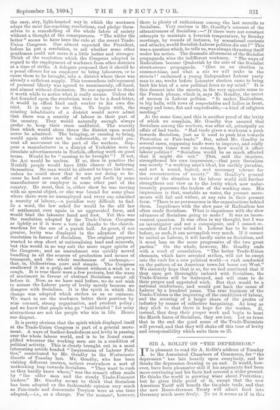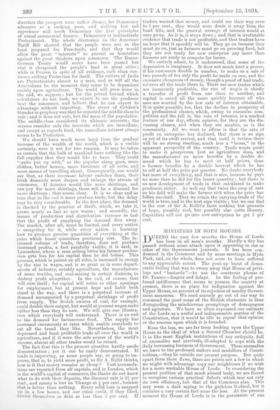SIR A. ROLLIT ON " THE DEPRESSION."
IT is pleasant to read Sir A. Rollit's address of Tuesday to the Associated Chambers of Commerce, for "the depression" has lain heavily upon everybody, and he thinks the depression drawing to an end. It would, how- ever, have been pleasanter still if his arguments had been more convincing and his facts had covered a wider ground. He thinks the world is growing wiser about Protection; but he gives little proof of it, except that the new American Tariff will benefit the tin-plate trade, and that the new Russo-German Treaty will admit food into Germany much more freely. To us it seems as if in this direction the prospect were rathar dreary, for Democracy advances at a rushing pace, and nothing but sad experience will teach Democracy the first principles of sound commercial finance. Democracy is instinctively Protectionist. The whole discussion on the American Tariff Bill showed that the people were not in the least prepared for Free-trade, and that they would allow the great " interests " to prevail as heretofore against the great thinkers upon commerce. The Russo- German Treaty would never have been passed but that it cheapened the people's food in great cities ; while in France, in spite of all evidence, each class con- tinues seeking Protection for itself. The natives of India are Protectionists almost to a man, and so will all the Australians be the moment they cease to be dependent mainly upon agriculture. The world will grow wiser in the end, we suppose ; but for the period beyond which calculators do not look, we expect to see the producer beat the consumer, and believe that he can export to advantage without importing. The secret of Cobden's blunder in prophecy was that he expected the middle-class to rule ; and it does not rule, but the mass of the population. The middle-class considered its ultimate interests ; the masses consider only the interests which are immediate, und except as regards food, the immediate interest always seems to be Protection.
We should have much more hope from the gradual increase of the wealth of the world, which is a visible certainty, were it not for two reasons. It may be taken as certain that the bulk of mankind have nothing like the full supplies that they would like to have. They could " quite put up with," as the popular slang goes, more clothes, bettor houses, more furniture of all sorts, and more means of travelling about. Consequently, one would say that, as their incessant labour enriches them, their fresh demands must deepen and enlarge the stream of commerce. If Asiatics would like more shirtings, and can pay for more shirtings, there will be a demand for more shirtings ; that seems clear. It is so clear and so true that in the end it must produce trade, but the delay may be very considerable. In the first place, the demand is checked by the practice of thrift, which, we take it, grows nearly as fast as new wants ; and secondly, the means of production and distribution increase so fast that the profit of supplying the demand dies away. The market, after all, must be limited, and every nation is competing for it, while every nation is learning how to produce greater quantities of everything at the price which lesser quantities previously cost. The in- creased volume of trade, therefore, does not produce increased profits, a fact painfully visible, it is said, in Lancashire, where a man selling twice his former produc- -tion gets less for his capital than he did before. This ,process, which is patent on all sides, is increased in energy by the rise in wages, and is so great as in some depart- ments of industry, notably agriculture, the manufacture of some textiles, and coal-mining in certain districts, to destroy profit altogether. In the end, of course, that will cure itself ; for capital will retire to other openings for employment, but at present hope and habit both stand in the way, and there is a perpetual increase of demand accompanied by a perpetual shrinkage of profit from supply. The Scotch owners of coal, for example, could double their output, but would at present wages make rather loss than they do now. We will give one illustra- tion which everybody will understand. There is no end to the demand for farinaceous food. The supply has increased enormously at rates which enable everybody to eat all the bread they like. Nevertheless, the most depressed and least profitable trade all over the world is agriculture, and if it were the sole source of the world's income, almost all other trades would be ruined.
The fact that this is the present situation hardly needs demonstration ; yet it can be easily demonstrated. If trade is improving, as some people say, or going to im- prove, that is, to yield more profit, as Sir A. Rollit thinks, how is it that money remains so cheap ? Vast accumula- tions are reported from all capitals, and in London, which is the world's capital of commerce, the Banks do not know what to do with their deposits, the discount rate is 21 per cent., and money is lent on 'Change at 4 per cent., because that is better than nothing. Every solid loan is snapped up in a few hours, and our cities could, if they liked, drown themselves in debt at less than 3 per cent. If traders wanted that money, and could see their way even to 5 per cent., they would soon drain it away from the bank tills, and the general average of interest would at once go up. As it is, it stays down ; and that is irrefutable evidence that trade is not profitable, and that traders hays no hope that it speedily will be. They go on because they must go on, just as farmers must go on growing food, but they are not ready for new enterprise any more than farmers are ready to compete for farms. We entirely admit, be it understood, that some of the depression is imaginary. It does not much hurt a grocer, if his customers double in number, to make on a sale of two pounds of tea only the profit he made on one, and the excessive cheapness of money, though a proof of bad trade, relieves all the trade there is. There are new trades which are immensely profitable, the rise of wages is chiefly a transfer of profit from one class to another, and capital is saved all the more quickly because all who save are worried by the low rate of interest obtainable. It is quite possible, too, that the decline in prosperity of the professional classes, which, owing to excessive com- petition and the fall in the rate of interest, is a marked feature of our day, affects opinion, for they are the dis- cussing classes, and when they are sombre, so is the community. All we want to affirm is that the rate of profit on enterprise has declined, that there is no sign as yet of its swift revival, and that until it revives there will be no strong reaction, much less a " boom," in the apparent prosperity of the country. Trade wants profit to make it prosperous, just as agriculture does, and the manufacturer no more benefits by a double de- mand which he has to meet at half prices, than a farmer benefits by a double harvest which he has to sell at half the price per quarter. No doubt everybody has more of everything, and that is nice, because he pays no more than he did for the lesser quantity ; but there is no new development of trade in that calculated to make producers richer. As well say that twice the crop of oats on his field will make the farmer rich when the price has fallen one-half. That we retain the carrying-trade of the world is true, and is the best sign visible ; but we can find in the rest of Sir A. Rollit's facts nothing but grounds of hope, possibly real, but possibly also quite illusory. Capitalists will not go into new enterprises to get 2 per cent.



































 Previous page
Previous page